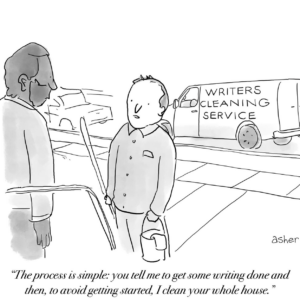
I saw the above cartoon by New Yorker cartoonist Asher Perlman the other day and felt seen. Every time a project calls for big thinking, I get excited by the possibilities. We have a few energetic conversations around the office. Then I open a new .doc and just stare, questioning my purpose on this mortal plane as I blink blankly into the void. I walk around in circles (metaphorical and literal), finding solace in any mundane task that comes my way. Timesheet! Expense report!! It’s my turn to do the dishes!!!
So when I saw Asher’s cartoon, I took comedic relief in the knowledge that I was not alone in this bad habit. But after a little more curious procrastination, I realized it may not be a bad habit at all. Procrastination is a means of unlocking creative productivity.
“I don’t think necessity is the mother of invention. Invention, in my opinion, arises directly from idleness, possibly also from laziness.” – Agatha Christie
Full disclosure, I am procrastinating right now. I should be writing a brand platform for a new client. But there are still a couple of days on the clock. So I am procrastinating by contemplating procrastination.
When it comes to big thinking, it always takes me a while to get focused. I can’t just pull it off the shelf. Sure, there are things you can do to inform and inspire bigger ideas. But there is no button to make the lightning strike. It might happen in five minutes. It might take five weeks. Or it could startle you in the shower at any point in between.
You can’t order your brain to generate 10 ideas on the spot the same as commanding your body to do 10 push-ups (not good ones, anyway). Although, doing those push-ups could actually help take your mind off the problem at hand, so it can really think about the problem at hand.
Sometimes you just need to get out of the way of your own brain.
“Psychologists would seem to agree, with strong evidence that creative insights are much more likely to occur after a period of ‘incubation’ – in which you focus on something entirely different from the job at hand, while your brain works away behind the scenes. This could include taking a walk, doing household chores or having a shower.”
That’s from Loizos Heracleous and David Robson in a piece for bbb.com. Read the whole, not-terribly-long piece here:
They continue:
“When you spend a long time focusing on one problem, you can become fixated on certain obvious solutions. A period of incubation should help you to widen your mental focus so that you can make connections and come back to the problem with a new perspective. Intriguingly, incubation may work best when your mind is distracted with an engaging but relatively easy task, so that it is given just enough room to wander freely.”

My brain has really enjoyed wandering the @belhavenmtnbike trails off of the Museum Trail.
I also found validation from the notion of “room to wander.” I’m a runner, and I particularly enjoy running on trails. When I run on the roads, I need a soundtrack. But once I get into the woods, I pop the AirPods out and take it all in (and try not to get lost). That’s when my mind really goes off leash. It shoots down rabbit holes that would never occur to me sitting in front of a screen. It’s not uncommon for me to spontaneously generate a few headlines or a new angle on a project around mile three. It is slightly annoying, as I then have to recite them over and over in my head until I get back home to a notebook. But I am always grateful for these brain blessings.
Let’s get back to the brand platform I was supposed to be writing at the beginning of this blog post – because my brain just did. I walked down the street to pick up lunch, and a breakthrough turn-of-phrase set me off to the races.
That’s when the head-down, hands-on work begins: scribbling, scrawling, deleting, revising and making the dang thing. Much like push-ups, getting that idea out of your head and into reality does take determined effort. It’s amazing how an impending deadline can sharpen that focus. But the work always seems to get better when you have enough time to not think about it and let your brain work its magic.


